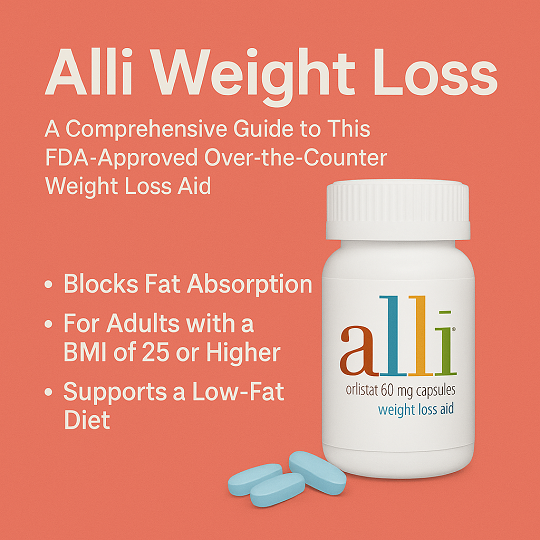
Alli Weight Loss: A Comprehensive Guide to This FDA-Approved Fat Blocker
Alli weight loss. If you’re exploring over-the-counter options to aid in your weight loss journey, you’ve likely come across Alli. As one of the only FDA-approved weight loss pills available without a prescription, Alli has become a popular choice among individuals aiming to shed extra pounds. But does it really work, and is it safe for everyone?
This comprehensive guide will dive deep into how Alli works, its benefits, potential side effects, and tips for effective use. Whether you’re just starting or looking to enhance your current regimen, this article will help you determine if Alli is the right tool for your weight loss goals.
What is Alli?
Alli (pronounced AL-eye) is the brand name for orlistat 60 mg, an over-the-counter (OTC) weight loss pill. It is a lower-dose version of the prescription drug Xenical (orlistat 120 mg).
Alli is intended for overweight adults with a BMI (Body Mass Index) of 25 or higher. It works by blocking the absorption of about 25% of the fat you consume, allowing it to pass through the digestive system instead of being stored in the body.
How Does Alli Work for Weight Loss?
Alli works in the digestive tract. Specifically, it inhibits an enzyme called lipase, which is responsible for breaking down dietary fat into smaller molecules that your body can absorb. When lipase is inhibited, fat passes undigested through your intestines and is excreted in the stool.
This fat-blocking action can significantly reduce your overall calorie intake from fat, helping you lose weight when combined with a reduced-calorie, low-fat diet.
Who Should Use Alli?
Alli is designed for adults 18 years or older who:
- Have a BMI of 25 or higher
- Are following a low-fat, calorie-controlled diet
- Are looking for an additional tool to support weight loss
It is not intended for those who are:
- Pregnant or breastfeeding
- Diagnosed with chronic malabsorption syndrome or cholestasis
- Taking certain medications such as cyclosporine or warfarin (consult a doctor)
Effectiveness: How Much Weight Can You Lose with Alli?
Clinical studies show that Alli users can lose 50% more weight than with diet and exercise alone. For example, if you lose 6 pounds through lifestyle changes, adding Alli may help you lose 9 pounds.
The average user loses 5 to 10 pounds over 6 months, though results vary depending on diet, activity level, and adherence.
Benefits of Alli
- Clinically Proven: Backed by multiple studies and approved by the FDA.
- Non-Stimulant: Unlike many weight loss supplements, Alli does not contain caffeine or stimulants.
- Accessible: Available over the counter without a prescription.
- Supports Long-Term Habits: Encourages users to adopt a low-fat, calorie-conscious diet.
- Visible Results: Most users see measurable weight loss in 2–3 months.
Side Effects and Risks
The most common side effects of Alli are gastrointestinal and are usually mild, but they can be unpleasant. These include:
- Oily spotting
- Gas with oily discharge
- Frequent or urgent bowel movements
- Fatty or loose stools
These effects typically occur when too much fat is consumed. Sticking to a low-fat diet (no more than 30% of total daily calories from fat) can reduce these symptoms.
Other rare but serious side effects include:
- Liver damage (very rare)
- Kidney stones
- Allergic reactions
It’s essential to consult a healthcare provider before beginning Alli, especially if you have pre-existing medical conditions.
How to Use Alli for Best Results
- Follow the Recommended Dosage: Take one Alli capsule (60 mg) three times a day with each fat-containing meal.
- Stick to a Low-Fat Diet: Limit fat to 15 grams per meal to minimize digestive side effects.
- Exercise Regularly: Combine Alli with regular physical activity for optimal results.
- Use a Daily Multivitamin: Alli can block the absorption of fat-soluble vitamins (A, D, E, and K). Take a multivitamin at bedtime, at least 2 hours apart from your last dose of Alli.
- Track Your Progress: Use food and activity journals or apps to monitor calories and fat intake.
Tips to Avoid Digestive Discomfort
- Avoid fried and fatty foods
- Eat smaller, more frequent meals
- Read food labels carefully for fat content
- Cook with low-fat methods like baking, grilling, or steaming
Real User Reviews: What Are People Saying About Alli?
Many users report modest but consistent weight loss with Alli when combined with a healthy lifestyle. Positive reviews highlight:
- Noticeable weight reduction within a few weeks
- Increased awareness of fat intake
- Motivation to maintain a healthier diet
However, negative reviews often mention:
- Unpleasant side effects when consuming too much fat
- Limited results without dietary changes
Is Alli Right for You?
Alli can be a helpful tool for weight loss, but it’s not a magic pill. It requires commitment to a healthy diet and lifestyle. If you’re someone who’s struggling to lose weight through diet and exercise alone, Alli may offer a supportive boost — especially if you’re mindful of fat intake and consistent in your routine.
Conclusion
Alli is a scientifically proven, FDA-approved over-the-counter weight loss aid that works by reducing fat absorption. It’s most effective when used alongside a calorie-reduced, low-fat diet and regular exercise. While it can help you lose more weight than dieting alone, it’s not without side effects — especially if dietary guidelines aren’t followed.
Before starting Alli, talk to your healthcare provider to ensure it’s safe and suitable for your needs. With proper use and realistic expectations, Alli could be the extra push you need on your path to a healthier weight.
References
- U.S. Food and Drug Administration (FDA)
“FDA Approves Over-the-Counter Alli (orlistat 60 mg)”
https://www.fda.gov - Mayo Clinic – Orlistat (Alli) Weight Loss Medication
“Orlistat (Alli) – How It Works, Side Effects, and Warnings”
https://www.mayoclinic.org - National Institutes of Health (NIH) – MedlinePlus
“Orlistat – Drug Information”
https://medlineplus.gov/druginfo/meds/a601244.html - Cleveland Clinic – Weight Loss Medications
“Orlistat: Uses, Side Effects, and Safety Tips”
https://my.clevelandclinic.org - Obesity Reviews Journal
Padwal, R. S., & Majumdar, S. R. (2007). “Drug treatments for obesity: Orlistat, sibutramine, and rimonabant: A clinical review.”
Obesity Reviews, 8(1), 93–108.
https://doi.org/10.1111/j.1467-789X.2006.00235.x - WebMD – Alli Weight Loss Pill
“How Does Alli Work and Is It Effective?”
https://www.webmd.com/diet/alli-weight-loss-pill - Drugs.com – Orlistat (Alli)
“Patient Information, Side Effects, and Drug Interactions”
https://www.drugs.com/alli.html





